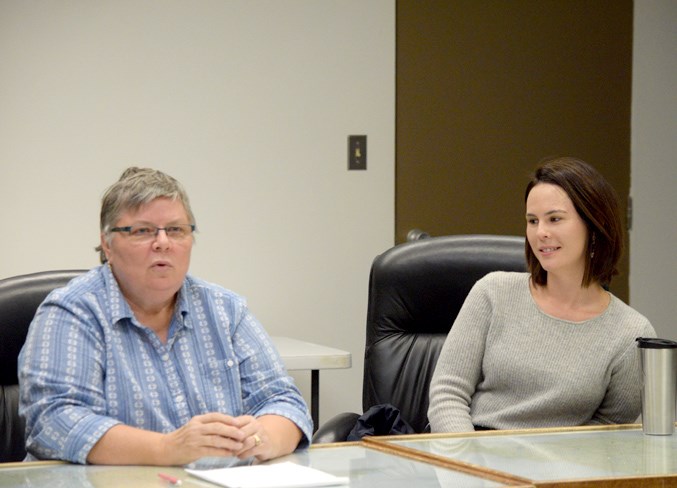Different council, same message.
On Sept. 19, local pharmacist Rita Lyster and Leigh Gradwell of the newly-revived physician attraction and retention committee told County of Barrhead councillors they need the municipality’s support in not only attracting and retaining health professionals, but to help bring the community’s existing physicians together to work more as a team.
“She [Lyster] was hugely helpful in our move. I don’t think I realized how much until I saw what was happening in other communities. When I think of what we had to learn especially in terms of winter . . . It would have been overwhelming without Rita’s help,” Gradwell said, adding that is in part the type of help she would like to provide to the other new medical professionals and their families.
Leigh and her husband Dr. Craig Gradwell came to Barrhead in 2015 after Alberta Health Services (AHS) recruited them.
The committee was first formed in 2007 when Dr. Jeff Hankinson and Dr. Kent Bernes, representing the Barrhead Medical Centre and the Barrhead Clinic respectively, approached town council asking them to form a local physician recruitment retention committee.
After the initial excitement, the committee has consisted of only Lyster and Barrhead’s mayor in recent years.
However, the duo is hoping to change that and asked for a councillor to sit on the committee, collaborate with the town in creating specialized welcome baskets as well as reinstating an annual budget.
Councillors deferred making a decision to a future meeting.
Leigh and Lyster made a similar request to Town of Barrhead councillors in August, who also tabled making a decision.
Leigh noted at one time the Rural Professions Health Action Plan (RhPAP) and local healthcare professional attraction committees did much of the work of bringing in physicians.
The number of doctors a community has is determined by Alberta Health Services, and as such, they are now the ones who do the recruiting.
Now, a major gap exists on the retention side of things.
“A physician only signs on for three to five years and then they often move on after that, Lyster said.
In the past, the committee helped doctors feel welcome by hosting dinners and giving incoming doctors a care package similar to the one Barrhead Family Community Support Services gives to new residents.
The package the Gradwells received included swim, bowling, and golf passes, as well as movie and rodeo tickets along with assorted information items.
Lyster said the committee’s primary focus would be retention.
“What the committee wants to do is to ensure more doctors stay by helping them more fully integrate.”
However, Lyster indicated that physicians are no longer the sole focus of their efforts.
“What we realized is we can’t keep our physicians in the community if we don’t have other supporting health disciplines as well,” she said, adding that is why RhPAP and the local committee are expanding to include a wide variety of health professions.
Lyster said that although the community has enough physicians and other health professionals, they’re in a precarious position and it wouldn’t take much for a crisis in healthcare to occur.
“We lost our obstetrics specialist, Dr. Adel Abdulhafid, and an anesthetic specialist left this summer,” she said.
She noted that while they still have a general practitioner anesthetist, as well as a surgeon, it does put pressure on the surgery program at the hospital.
The community also has 11 doctors in the town’s three medical clinics, but Lyster noted they in all likelihood will lose one of them in the near future, as they are in the process of relocating.
She also anticipates that within the year, Barrhead will lose the obstetric services, of another doctor, who, while staying in town, is planning to concentrate on other areas of his practice.
Lyster said the other issue the committee hopes to tackle is to create more of a team atmosphere in the medical community.
“There has always been a bit of tension in the medical community,” she said, noting that is especially true between the community’s two oldest clinics.
However, that is starting to slowly change.
Lyster added the other obstacle to creating a team atmosphere is that medicine often is a solitary practice, which doesn’t allow them to get to know each other personally.
The committee hopes to change this by scheduling social activities where medical professionals can get together — the first one being a physician’s only dinner in October.
“Physicians are more likely to stay if they feel they are part of a team and have that support. It can be something as simple a spouse going over and helping them with their kids or physicians being comfortable enough with each other to call and say they need help in emerg,” Leigh added.
“At the moment we haven’t been cultivating those relationships ... Instead, we concentrate on finding replacements for what seems to be a revolving door of health professionals leaving our community.”
The other issue the committee hopes to improve is helping the spouses integrate into the community.
“That’s a big piece of the puzzle and it is something we haven’t always done well,” Lyster said, giving the example of a local doctor whose family lives in Edmonton.
The committee also hopes to attract future health professionals by hosting RhPAP skills events where first-and second-year medical students have the opportunity to visit rural communities and experience what rural medicine is all about.
“Medical students would come and practice suturing, or whatever it is,” Lyster said. “ [Then we can] showcase the community. Organize ice fishing at Thunder Lake, take them to the pool, or whatever. Show them what they can do in their downtime, because living in a rural community isn’t just work 24/7, it is about promoting the community and showing them what kind of lifestyle they can have here.”



